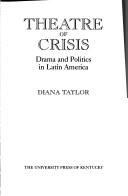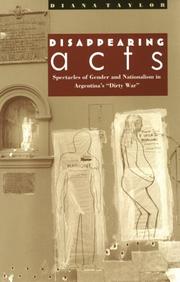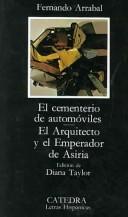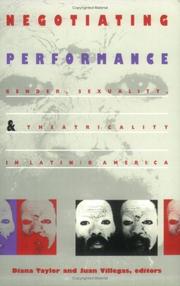| Listing 1 - 10 of 18 | << page >> |
Sort by
|

ISBN: 9780822331360 9780822331230 0822331233 0822331365 0822385317 1282921037 9786612921032 Year: 2003 Publisher: Durham, N.C. Duke University Press
Abstract | Keywords | Export | Availability | Bookmark
 Loading...
Loading...Choose an application
- Reference Manager
- EndNote
- RefWorks (Direct export to RefWorks)
Diana Taylor provides a new understanding of the vital role of performance in the Americas. From plays to official events to grassroots protests, performance, she argues, must be taken seriously as a means of storing and transmitting knowledge. Taylor reveals how the repertoire of embodied memory--conveyed in gestures, the spoken word, movement, dance, song, and other performances--offers alternative perspectives to those derived from the written archive and is particularly useful to a reconsideration of historical processes of transnational contact. The Archive and the Repertoire invites a remapping of the Americas based on traditions of embodied practice. Examining various genres of performance including demonstrations by the children of the disappeared in Argentina, the Peruvian theatre group Yuyachkani, and televised astrological readings by Univision personality Walter Mercado, Taylor explores how the archive and the repertoire work together to make political claims, transmit traumatic memory, and forge a new sense of cultural identity. Through her consideration of performances such as Coco Fusco and Guillermo Gómez-Peña's show Two Undiscovered Amerindians Visit, Taylor illuminates how scenarios of discovery and conquest haunt the Americas, trapping even those who attempt to dismantle them. Meditating on events like those of September 11, 2001 and media representations of them, she examines both the crucial role of performance in contemporary culture and her own role as witness to and participant in hemispheric dramas.
Sociology of minorities --- Theatrical science --- America --- #VCV monografie 2005 --- #SBIB:39A5 --- #SBIB:39A74 --- #SBIB:316.7C210 --- Kunst, habitat, materiële cultuur en ontspanning --- Etnografie: Amerika --- Cultuursociologie: kunst: algemeen --- Ethnicity --- Memory --- Minorities --- North and south. --- Performance art --- Performing arts --- Postcolonialism and the arts --- Postcolonialism --- Social aspects --- Social conditions. --- Political aspects --- Civilization. --- Ethnic relations. --- Social conditions --- North and south --- Arts, Modern --- Happenings (Art) --- Post-colonialism --- Postcolonial theory --- Political science --- Decolonization --- Arts and postcolonialism --- Arts --- Show business --- South and north --- Acculturation --- Culture conflict --- Retention (Psychology) --- Intellect --- Psychology --- Thought and thinking --- Comprehension --- Executive functions (Neuropsychology) --- Mnemonics --- Perseveration (Psychology) --- Reproduction (Psychology) --- Ethnic identity --- Group identity --- Cultural fusion --- Multiculturalism --- Cultural pluralism --- Ethnic minorities --- Foreign population --- Minority groups --- Persons --- Assimilation (Sociology) --- Discrimination --- Ethnic relations --- Majorities --- Plebiscite --- Race relations --- Segregation --- Americas --- New World --- Western Hemisphere --- Mémoire --- Art de performance --- Arts du spectacle --- Art et histoire --- Société --- Aspect politique --- Mémoire --- Société
Book
ISBN: 9780822359548 9780822359975 9780822375128 0822359545 0822359979 0822375125 Year: 2016 Publisher: Durham, N.C. Duke University Press
Abstract | Keywords | Export | Availability | Bookmark
 Loading...
Loading...Choose an application
- Reference Manager
- EndNote
- RefWorks (Direct export to RefWorks)
Taylor's fascinating, multicultural analysis of performance explores not only what performance is but also what it does?what it allows one to see, to experience, and to theorize?and ?its complex relation to systems of power? (to quote from chapter 1). This is Taylor?s English-language adaptation of the Spanish edition of Performance, which was written in concert with the Hemispheric Institute of Performance and Politics, an association of artist-activists, universities, and institutions throughout the Americas, of which Taylor is founding director. The illustrations, most of which come from the institute?s archive, represent a wide range of politically charged work in the spirit of Augusto Boal and Bertolt Brecht, most of it from the Western hemisphere. A small, glossy volume with sleek typography that draws the eye to the book's salient points, Performance comprises chapters on performance frames, histories, uses, and means of political activism, and it features the work of noted "artivists" (artist-activists) Marina Abramović, Nao Bustamante, Regina José Galindo, H.I.J.O.S., and Yes Men, among others. Taylor closes with the admonition that ?performance is world-making. [One] needs to understand it.? This book helps accomplish that goal.
Art --- Theatrical science --- Performance art. --- Performance art --- Art de performance --- Political aspects. --- Aspect politique --- Performance --- Arts, Modern --- Happenings (Art) --- Performing arts --- Political aspects

ISBN: 0813117348 9780813117348 Year: 1991 Publisher: Lexington, Ky.: University press of Kentucky,
Abstract | Keywords | Export | Availability | Bookmark
 Loading...
Loading...Choose an application
- Reference Manager
- EndNote
- RefWorks (Direct export to RefWorks)
Sociology of literature --- English literature --- Thematology --- Spanish-American literature --- Drama --- Politics and literature --- Spanish American drama --- Politique et littérature --- Théâtre hispano-américain --- History and criticism --- Histoire et critique --- Politique et littérature --- Théâtre hispano-américain --- Spanish American drama - 20th century - History and criticism --- Politics and literature - Latin America --- theatergeschiedenis

ISBN: 0822318776 0822318687 9780822318774 9780822318682 0822399288 Year: 1997 Publisher: Durham Duke University Press
Abstract | Keywords | Export | Availability | Bookmark
 Loading...
Loading...Choose an application
- Reference Manager
- EndNote
- RefWorks (Direct export to RefWorks)
In Disappearing Acts Diana Taylor looks at how national identity is shaped, gendered, and contested through spectacle and relationship. The specific identity in question is that of Argentina, and Taylor's focus is directed toward the years 1976 to 1983 in which the Argentine armed forces were pitted against the Argentine people in that nation's "Dirty War." Combining feminism, cultural studies, and performance theory, Taylor analyzes the political spectacles that comprised the war - concentration camps, torture, "disappearances"--As well as the rise of theatrical productions, demonstrations, and other performative practices that attempted to resist and subvert the Argentine military. Taylor uses performance theory to explore how public spectacle both builds and dismantles a sense of national and gender identity. Here, nation is understood as a product of communal "imaginings" that are rehearsed, written and staged - and spectacle is the desiring machine at work in those imaginings. Taylor argue that the founding scenario of Argentineness stages the struggle for national identity as a battle between men - fought on, over, and through the feminine body of the Motherland. She shows how the military's representations of itself as the model of national authenticity established the parameters of the conflict in the 70s and 80s, feminized the enemy, and positioned the public - limiting its ability to respond. Those who challenged the dictatorship, from the Mothers of the Plaza de Mayo to progressive theater practitioners, found themselves in what Taylor describes as "bad scripts." Describing the images, myths, performances, and explanatory narratives that have informed Argentina's national drama, Disappearing Acts offers a telling analysis of the aesthetics of violence and the disappearance of civil society during Argentina's spectacle of terror.
Argentine drama --- Disappeared persons --- Theater --- Violence --- History and criticism. --- Political aspects --- History --- Argentina --- Politics and government --- #SBIB:309H241 --- #SBIB:328H32 --- Violent behavior --- Social psychology --- Dramatics --- Histrionics --- Professional theater --- Stage --- Theatre --- Performing arts --- Acting --- Actors --- History and criticism --- Andere media: functies, genres, historiek --- Instellingen en beleid: Midden en Latijns-Amerika --- Missing persons --- Victims of state-sponsored terrorism
Book
ISBN: 9781478008552 9781478009443 Year: 2020 Publisher: Durham : Duke University Press,
Abstract | Keywords | Export | Availability | Bookmark
 Loading...
Loading...Choose an application
- Reference Manager
- EndNote
- RefWorks (Direct export to RefWorks)
"¡PRESENTE! investigates the many answers to a seemingly simple question: What does it mean to be present? Performance studies scholar Diana Taylor answers that question by offering an expansive explication of presence as both ethical command and performative knowledge production. Taking the histories of state violence, colonialism, and imperialism as her starting point, Taylor situates being ¡Presente! as an embodied and performed practice of standing alongside those harmed by historical and ongoing violence. Noting that Present/e is simultaneously single and plural in English and Spanish, and drawing on Jean Luc Nancy's formulation of being singular plural, Taylor asks how presence is imbricated in questions of subject formation and collectivity. She begins with reframing the racialization of Latin Americans as a coming into presence through colonial conquest-a presence not as subjects but as subjugated objects-and asks what was made absent through this racialized process. For Taylor, the epistemicide of Indigenous, Native, and African ways of knowing stands at the center of this process of presence and absence. To counter this ongoing epistemicide, Taylor situates ¡Presente! as a performative and decolonial mode of knowledge production that decenters European Enlightenment traditions and seriously takes up Native, Indigenous, and African ways of knowledge and temporality. Grounded in performance studies, this book links knowledge to action as a doing practice, or what Taylor calls a "peripatetic strategy" that emphasis movement in learning. This book offers an expansive theory of ¡Presente! in various locations and situations: the original colonial conquest of Columbus and the Spanish; the May 1968 student protests; a study in Zapatistan autonomy; the 43 disappeared students of Ayotzinapa; queer histories of Mexico; and the former torture centers of the Pinochet dictatorship. Throughout these varied locations, Taylor weaves a methodology, theory, and practice of ¡Presente!. This book will be of interest to students and scholars of performance studies, Latin American studies, American studies, critical ethnic studies, colonial, decolonial, and postcolonial studies, and queer theory"--
Decolonization --- Decolonization. --- Eurocentrism. --- Hispanic Americans in the performing arts. --- Hispanic Americans --- Knowledge, Theory of. --- Performance art --- Performative (Philosophy) --- Performing arts --- Presence (Philosophy) --- Social epistemology. --- Race identity. --- Political aspects. --- Political aspects --- Latin America. --- United States.
Book
ISBN: 9789569320828 9789569320835 Year: 2015 Publisher: Santiago de Chile Ediciones Universidad Alberto Hurtado
Abstract | Keywords | Export | Availability | Bookmark
 Loading...
Loading...Choose an application
- Reference Manager
- EndNote
- RefWorks (Direct export to RefWorks)
Philosophy and psychology of culture --- Iconography --- Theatrical science --- Latin America
Book
ISBN: 1478008555 147800889X 1478009446 Year: 2020 Publisher: Duke University Press
Abstract | Keywords | Export | Availability | Bookmark
 Loading...
Loading...Choose an application
- Reference Manager
- EndNote
- RefWorks (Direct export to RefWorks)

ISBN: 8437604702 9788437604701 Year: 1984 Volume: 198 Publisher: Madrid: Cátedra,
Abstract | Keywords | Export | Availability | Bookmark
 Loading...
Loading...Choose an application
- Reference Manager
- EndNote
- RefWorks (Direct export to RefWorks)

ISBN: 0822315157 082239927X 9780822315155 0822315041 1322140901 Year: 1994 Publisher: Durham: Duke university press,
Abstract | Keywords | Export | Availability | Bookmark
 Loading...
Loading...Choose an application
- Reference Manager
- EndNote
- RefWorks (Direct export to RefWorks)
In Negotiating Performance, major scholars and practitioners of the theatrical arts consider the diversity of Latin American and U. S. Latino performance: indigenous theater, performance art, living installations, carnival, public demonstrations, and gender acts such as transvestism. By redefining performance to include such events as Mayan and AIDS theater, the Mothers of the Plaza de Mayo, and Argentinean drag culture, this energetic volume discusses the dynamics of Latino/a identity politics and the sometimes discordant intersection of gender, sexuality, and nationalisms.The Latin/o America examined here stretches from Patagonia to New York City, bridging the political and geographical divides between U.S. Latinos and Latin Americans. Moving from Nuyorican casitas in the South Bronx, to subversive street performances in Buenos Aires, to border art from San Diego/Tijuana, this volume negotiates the borders that bring Americans together and keep them apart, while at the same time debating the use of the contested term "Latino/a." In the emerging dialogue, contributors reenvision an inclusive "América," a Latin/o America that does not pit nationality against ethnicity—in other words, a shared space, and a home to all Latin/o Americans.Negotiating Performance opens up the field of Latin/o American theater and performance criticism by looking at performance work by Mayans, women, gays, lesbians, and other marginalized groups. In so doing, this volume will interest a wide audience of students and scholars in feminist and gender studies, theater and performance studies, and Latin American and Latino cultural studies.Contributors. Judith Bettelheim, Sue-Ellen Case, Juan Flores, Jean Franco, Donald H. Frischmann, Guillermo Gómez-Peña, Jorge Huerta, Tiffany Ana López, Jacqueline Lazú, María Teresa Marrero, Cherríe Moraga, Kirsten F. Nigro, Patrick O’Connor, Jorge Salessi, Alberto Sandoval, Cynthia Steele, Diana Taylor, Juan Villegas, Marguerite Waller
Theater --- Theater and society --- Hispanic American theater --- History --- Dramatics --- Histrionics --- Professional theater --- Stage --- Theatre --- Performing arts --- Acting --- Actors --- Theater, Hispanic American --- Society and theater --- History. --- Social status --- Social aspects --- Theater - Latin America - History --- Theater and society - Latin America

ISBN: 9780822332275 9780822332404 Year: 2003 Publisher: Durham Duke University Press
Abstract | Keywords | Export | Availability | Bookmark
 Loading...
Loading...Choose an application
- Reference Manager
- EndNote
- RefWorks (Direct export to RefWorks)
Holy Terrors presents exemplary original work by fourteen of Latin America’s foremost contemporary women theatre and performance artists. Many of the pieces—including one-act plays, manifestos, and lyrics—appear in English for the first time. From Griselda Gambaro, Argentina's most widely recognized playwright, to such renowned performers as Brazil's Denise Stoklos and Mexico’s Jesusa Rodríguez, these women are involved in some of Latin America's most important aesthetic and political movements. Of varied racial and ethnic backgrounds, they come from across Latin America—Argentina, Brazil, Mexico, Chile, Colombia, Puerto Rico, Peru, and Cuba. This volume is generously illustrated with over seventy images. A number of the performance pieces are complemented by essays providing context and analysis. The performance pieces in Holy Terrors are powerful testimonies to the artists' political and personal struggles. These women confront patriarchy, racism, and repressive government regimes and challenge brutality and corruption through a variety of artistic genres. Several have formed theatre collectives—among them FOMMA (a Mayan women’s theatre company in Chiapas) and El Teatro de la máscara in Colombia. Some draw from cabaret and ‘frivolous’ theatre traditions to create intense and humorous performances that challenge church and state. Engaging in self-mutilation and abandoning traditional dress, others use their bodies as the platforms on which to stage their defiant critiques of injustice. Holy Terrors is a unique English-language presentation of some of Latin America's fiercest, most provocative art. Contributors Sabina Berman Tania Bruguera Petrona de la Cruz Cruz Diamela Eltit Griselda Gambaro Astrid Hadad Teresa Hernández Rosa Luisa Márquez Teresa Ralli Diana Raznovich Jesusa Rodríguez Denise Stoklos Katia Tirado Ema Villanueva
Art --- Theatrical science --- body art [visual works, performance] --- performances [creative events] --- performance art --- performance artists --- vrouw in de kunst --- maatschappijkritiek --- gender --- Latin America
| Listing 1 - 10 of 18 | << page >> |
Sort by
|

 Search
Search Feedback
Feedback About UniCat
About UniCat  Help
Help News
News